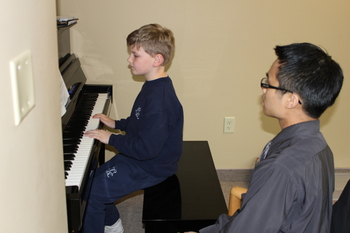I don’t necessarily believe in going through mindless repetitions when practicing music (see my last blog, Stop Practicing, Start Playing!), but sometimes I just cannot execute a certain passage successfully. The thought of practicing the passage “five times a day, every day” turns me off from playing my instrument, to be completely honest. But if I make the trouble spot small enough (sometimes it just comes down to two notes, or a measure plus the next beat), and I keep the number of repetitions to a minimum, then I can bear the thought. This type of practicing becomes useful and efficient. I don’t just practice hard, but I practice smart.
I play the “pen game” with my students during the lesson when they cannot figure out (or did not practice) a certain spot. The objective is to play the passage three times in a row perfectly. When they play it once correctly, they take one of three pens from one side of the piano and move it to the other side. Subsequently, each time they play the passage correctly, they move another pen over. If they make a mistake, then they return the pens and start over again. This game takes a lot of mental and physical concentration, especially when it’s time for the third try and the pressure is on. (They can also put pennies or jelly beans in a jar to mix things up at home!)
This exercise may sound cruel to some (I personally wince a bit when I hear “play the passage three times in a row perfectly”),  but I have three ideas to keep in mind:
but I have three ideas to keep in mind:
- Let the student control the pens. He or she decides for him/herself whether the trial was successful. In the beginning of the week, they may be more forgiving as to what counts as “perfect.” The day or two before the lesson, however, they may be tougher on themselves. By having the student be in control, the process becomes less of a test or punishment and more of a game. The student gains independence in the ability to evaluate his/her own progress during the practice session.
- Another important condition of the game is to make the passage small enough for possible success. The smaller the passage, the less frustration ensues. The passage must be short enough in order to isolate the issue—often a fingering change, big leap, etc. If even one measure is too much to handle, then perhaps try using one hand alone (for piano students). The key is to make the seemingly impossible task much more manageable.
- The last step of the game is to integrate the passage into a larger whole—in other words, start at the beginning of the phrase or section and play through the passage to the end. (This should seem much easier after playing the pen game with the isolated passage!) This integration is often ignored during practice sessions and leads to the familiar “I played it so much better at home, I promise!” Trust me, I’ve been there with my own teacher during my weekly lesson. The reality is that we have not simulated the whole picture enough when we practice at home. Then when we are put on the spot (during a lesson or performance), external factors come into play, and we freeze up.
It may be tough to encourage smart practicing for ourselves as well as (and even more so) for young kids. I find that the essence behind the “pen game” strikes the perfect balance between reinforcing a tough passage effectively while keeping the practicing session fresh and exciting. Students generally enjoy playing the game with me during lessons, so try doing the same with them at home. (Also, please let me know if pennies or jelly beans makes things more interesting!)
Request a Trial Piano Lessons with Richard Woo at no cost to you!
Richard Woo teaches Piano at award-winning Hunterdon Academy of the Arts in Flemington, NJ


COMMENTS